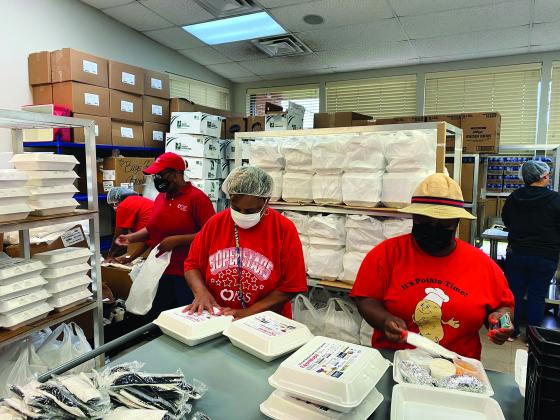Mental Health Awareness Month
It’s no secret, and certainly no surprise, that loneliness can lead to depression, and that mental and physical health are strongly correlated. During the COVID-19 pandemic, a large portion of the nation’s population was forced into seclusion to stem the spread of the highly transmissible virus. Mental health experts have since noted that this compulsory confinement created a spike in cases of depression and other disturbances in people’s emotional wellbeing.
The involuntary isolation temporarily imposed upon such a normally social populace is a condition many seniors experience all too frequently, describes Nutrition and Services for Seniors President/CEO Janci Kimball, which is why the daily visits Meals on Wheels volunteers make to elderly and disabled individuals are so vital to their mental and physical health. According to her, sating seniors’ hunger for companionship is as much a part of her organization’s mission as providing the nourishing fare her team delivers.
“We are seeing the mental health issues that a lot of people are facing because everybody was at home and isolated, and indoors, not able to go anywhere, and maybe experiencing a little bit tighter income, because many lost jobs during COVID-19,” Kimball explains. “Just look how we have reacted to it! This is what our seniors experience every single day. This is nothing new for them. Homebound seniors are especially isolated; they’re stuck in their homes and can’t go anywhere.
“We’re trying to get out there and see these people… Many times, we’re the only human interaction that they get – and that may be the only meal that they get every day. That’s why our services are so important, because we don’t just go drop a box on the porch and leave it. It’s more than just a meal. We spend time with them. We look at them. The delivery team is trying to spot changes in their conditions and elder abuse.”
A 2020 report from the National Academies of Sciences, Engineering, and Medicine (NASEM), titled “Social Isolation and Loneliness in Older Adults: Opportunities for the Health Care System,” revealed that about one-quarter of Americans aged 65 and older are considered “socially isolated” and “a significant proportion of adults in the United States report feeling lonely.” This type of depression can be deadly, NASEM warned.
“Social isolation and loneliness are serious yet underappreciated public health risks that affect a significant portion of the older adult population… People who are 50 years of age or older are more likely to experience many of the risk factors that can cause or exacerbate social isolation or loneliness, such as living alone, the loss of family or friends, chronic illness, and sensory impairments,” NASEM detailed. “A substantial body of evidence demonstrates that social isolation presents a major risk for premature mortality, comparable to other risk factors such as high blood pressure, smoking or obesity.”
The National Institute on Aging (NIA) similarly cautions, “As we age, many of us are alone more often than when we were younger, leaving us vulnerable to social isolation and loneliness – and related health problems such as cognitive decline, depression and heart disease.
“Research has linked social isolation and loneliness to higher risks for a variety of physical and mental conditions: high blood pressure, heart disease, obesity, a weakened immune system, anxiety, depression, cognitive decline, Alzheimer’s disease, and even death.
“People who find themselves unexpectedly alone due to the death of a spouse or partner, separation from friends or family, retirement, loss of mobility, and lack of transportation are at particular risk.”
Kimball says her first-hand experiences confirm NIA’s conclusions.
“When seniors retire, they are taken out of that loop of friends that they were with, and they’re taken out of the routine that they normally had for, sometimes, up to 20 years, during which they’ve worked at one or more facilities,” says Kimball. “They’ve worked all their lives and, suddenly, here they are retired. The friends that they had are still working or they’re moving on, and so they start to feel that loneliness and isolation. They may not even realize it, but that’s what makes them sit in their chairs and tend to watch TV more and just ‘relax.’ Well, that sedentary lifestyle is such a danger to them, because not only is it terrible for their health, but it is terrible for their mental state.”
As they hear news about shootings, illness, natural disasters and other stressful scenarios while home all alone, some seniors may begin to dwell on these issues and feel anxiety.
“They may get very panicked after being cooped up like that,” she shared. “A lot of times, we are the only cavalry they may have. If they have fallen in their homes, they may lie there overnight – but they know we are coming! They know that we will get them help.”
Activity is key to combating depression and loneliness, Kimball submits.
“They just have to get out in the community and socialize,” she proposed. “We try to help them with that too by offering transportation services and providing congregate dining, where we can, for people 60 and older. We currently have eight places in Hardin and Jefferson counties where they can congregate for meals. They can come play cards, they can come eat with friends, they can just come by themselves and meet new people. It’s so important to keep that social activity going and keep your mind going.”
NIA’s research agrees.
“People who engage in meaningful, productive activities with others tend to live longer, boost their mood, and have a sense of purpose,” the organization reports. “These activities seem to help maintain their well-being and may improve their cognitive function, studies show.”
In order to continue providing the resources it offers and expand Nutrition and Services for Seniors programs, Kimball says she needs a larger pool of volunteers.
“We need volunteers desperately to help keep this outreach going,” Kimball related. “They are the reason that we’ve been able to keep up with this. We have our own drivers, and we’ve had volunteers who help us accommodate all of these people, and keep delivering to these people and make a difference in these people’s lives.
“What if there was no program like this? What would they do? It’s just so important!”
Help “deliver the difference” with Nutrition and Services for Seniors and its Meals on Wheels program. To find out how to volunteer or donate, visit the nonprofit online at www.seniormeals.org or call (409) 892-4455.
This article represents the third in a series throughout May Mental Health Awareness Month.



